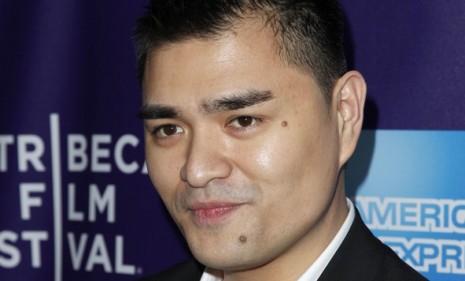The Pulitzer-winning journalist who's also an illegal immigrant
After 14 years of hiding the truth about his immigration status, Jose Antonio Vargas comes clean, and declares, "I'm done running"

A free daily email with the biggest news stories of the day – and the best features from TheWeek.com
You are now subscribed
Your newsletter sign-up was successful
Former Washington Post reporter Jose Antonio Vargas has set off a new round of debate about immigration reform by revealing in The New York Times Magazine that he is in the U.S. illegally. Vargas, who shared a Pulitzer Prize for coverage of the 2007 Virginia Tech shootings, says he left the Phillippines when he was 12, and came to live with his grandparents, both naturalized U.S. citizens, in California. It wasn't until he was 16 that he found out he was here illegally, when he tried to get a driver's license and was told at the DMV that the green card his grandfather had given him was a fake. Vargas says he has been looking over his shoulder ever since, and telling quite a few lies to cover his trail.
There are 11 million undocumented immigrants seeking a better life in the U.S., says Pema Levy at The American Prospect, but Vargas' moving story will demonstrate "the pain caused by our immigration system in a way faceless statistics cannot." Not so fast, says Bryan Preston at Pajamas Media. The liberals praising Vargas for his confession are overlooking the fact that he committed crimes to stay in this country, including using phony documents to get scholarships and "jobs that otherwise would have gone to others who are here legally." Here, an excerpt from Vargas' account of his life as an illegal immigrant:
I convinced myself that if I worked enough, if I achieved enough, I would be rewarded with citizenship. I felt I could earn it.
The Week
Escape your echo chamber. Get the facts behind the news, plus analysis from multiple perspectives.

Sign up for The Week's Free Newsletters
From our morning news briefing to a weekly Good News Newsletter, get the best of The Week delivered directly to your inbox.
From our morning news briefing to a weekly Good News Newsletter, get the best of The Week delivered directly to your inbox.
I've tried. Over the past 14 years, I've graduated from high school and college and built a career as a journalist, interviewing some of the most famous people in the country. On the surface, I've created a good life. I've lived the American dream.
But I am still an undocumented immigrant. And that means living a different kind of reality. It means going about my day in fear of being found out. It means rarely trusting people, even those closest to me, with who I really am. It means keeping my family photos in a shoebox rather than displaying them on shelves in my home, so friends don't ask about them. It means reluctantly, even painfully, doing things I know are wrong and unlawful. And it has meant relying on a sort of 21st-century underground railroad of supporters, people who took an interest in my future and took risks for me....
I'm done running. I'm exhausted. I don't want that life anymore.
Read the entire article at The New York Times Magazine.
A free daily email with the biggest news stories of the day – and the best features from TheWeek.com
-
 Why is the Trump administration talking about ‘Western civilization’?
Why is the Trump administration talking about ‘Western civilization’?Talking Points Rubio says Europe, US bonded by religion and ancestry
-
 Quentin Deranque: a student’s death energizes the French far right
Quentin Deranque: a student’s death energizes the French far rightIN THE SPOTLIGHT Reactions to the violent killing of an ultraconservative activist offer a glimpse at the culture wars roiling France ahead of next year’s elections
-
 Secured vs. unsecured loans: how do they differ and which is better?
Secured vs. unsecured loans: how do they differ and which is better?the explainer They are distinguished by the level of risk and the inclusion of collateral
-
 The billionaires’ wealth tax: a catastrophe for California?
The billionaires’ wealth tax: a catastrophe for California?Talking Point Peter Thiel and Larry Page preparing to change state residency
-
 Bari Weiss’ ‘60 Minutes’ scandal is about more than one report
Bari Weiss’ ‘60 Minutes’ scandal is about more than one reportIN THE SPOTLIGHT By blocking an approved segment on a controversial prison holding US deportees in El Salvador, the editor-in-chief of CBS News has become the main story
-
 Has Zohran Mamdani shown the Democrats how to win again?
Has Zohran Mamdani shown the Democrats how to win again?Today’s Big Question New York City mayoral election touted as victory for left-wing populists but moderate centrist wins elsewhere present more complex path for Democratic Party
-
 Millions turn out for anti-Trump ‘No Kings’ rallies
Millions turn out for anti-Trump ‘No Kings’ ralliesSpeed Read An estimated 7 million people participated, 2 million more than at the first ‘No Kings’ protest in June
-
 Ghislaine Maxwell: angling for a Trump pardon
Ghislaine Maxwell: angling for a Trump pardonTalking Point Convicted sex trafficker's testimony could shed new light on president's links to Jeffrey Epstein
-
 The last words and final moments of 40 presidents
The last words and final moments of 40 presidentsThe Explainer Some are eloquent quotes worthy of the holders of the highest office in the nation, and others... aren't
-
 The JFK files: the truth at last?
The JFK files: the truth at last?In The Spotlight More than 64,000 previously classified documents relating the 1963 assassination of John F. Kennedy have been released by the Trump administration
-
 'Seriously, not literally': how should the world take Donald Trump?
'Seriously, not literally': how should the world take Donald Trump?Today's big question White House rhetoric and reality look likely to become increasingly blurred